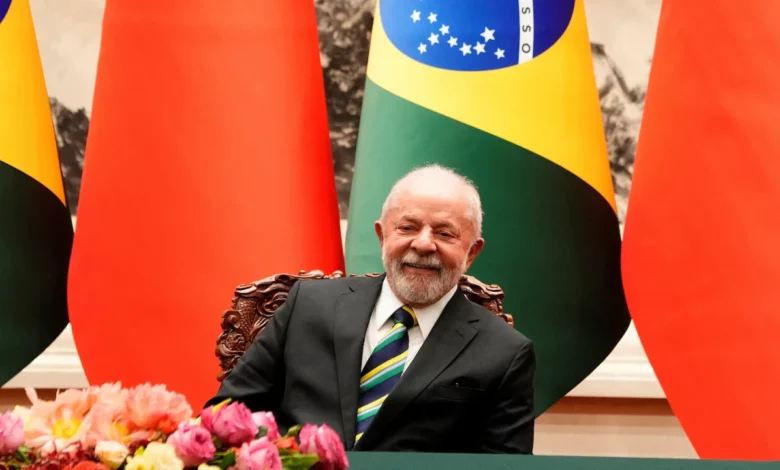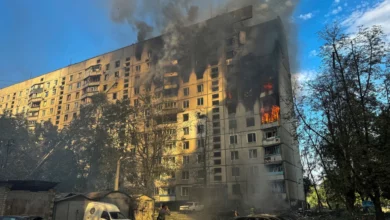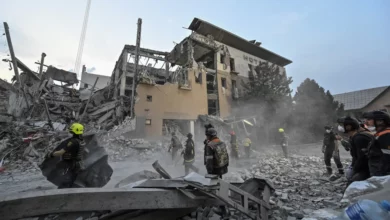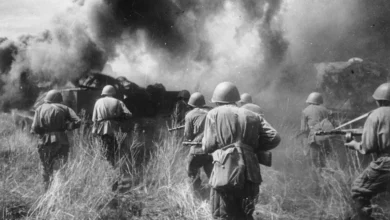
Without offering much detail on the plan, Lula, as he is known, seems to be fully embodying his government’s line that “Brazil is back” — that is, back to claim a role in global politics. He says he aims to form a coalition of countries willing to intervene and lead efforts for peace in Ukraine, though in the process is finding himself treading a thin line with the world’s biggest powers.
Lula’s proposal is to create “a G20 for peace” – a group of countries strong enough to be respected at the negotiating table, but that are still considered by some as neutral in the conflict between Russia and Ukraine. Indonesia, India, and China would play a crucial role in his vision, but Latin American countries are also invited to join the apparent initiative.
When he launched his political comeback in 2022, Lula told Time magazine that he thought both Russia and Ukraine were responsible for the conflict. Lula condemned Russia’s decision to invade its neighbor, but controversially claimed Ukrainian President Volodymyr Zelensky could have done more to avoid the conflict. Once in office, he insisted that Brazil would not take a side.
But when German Chancellor Olaf Scholtz recently encouraged Brazil to contribute weapons to Ukraine’s defense, Lula felt compelled to do something, explains Guilherme Casarões, political scientist and professor at Fundação Getúlio Vargas’ Public Administration School.
“He was sitting on the fence, he was very comfortable where he was, and now he had to get off the fence,” Casarões said.
Lula could not contemplate sending weapons – a step that would go far beyond Brazil’s traditional foreign policy, suggested the analyst.
“No Brazilian administration, not even Bolsonaro’s, I’d say, would send weapons to Ukraine. Brazil doesn’t engage in wars we have nothing to do with, Brazil doesn’t participate unless it’s a world war of sorts,” Casarões said.
But he couldn’t do nothing, either – after all, Lula had promised to bring Brazil “back” to the world stage.
“He could have just said ‘no’, but he did not,” says Casarões. “Instead he said, ‘Ok I’m not sending weapons to Ukraine but let’s try to broker peace, let’s use Brazil’s reputation and my own skills as a mediator to allow for a peace summit to take place, let’s try to work it out. If I am to take sides, let me take the side of dialogue’.”
A hard sell
The United States, France, and Germany have heard Lula’s pitch to create a team of peacemakers. Lula has also broached the idea with Chinese leader Xi Jinping, but left Beijing earlier this month without any formal commitment.
Lula has struggled to make his proposal widely persuasive. One controversial idea that he has floated for a possible resolution would see Ukraine cede Crimea, which Russia annexed in 2014 – a concession that Kyiv has ruled out and which the White House has described as “simply misguided.”
Lula’s shoot-from-the-hip approach to consensus-building has also been rocky. Until recently, the US – a close ally to Kyiv – had largely kept quiet about Lula’s comments on Ukraine. But while still in Beijing last week, Lula took aim directly at Washington, who along with the EU have been major suppliers of defensive arms and aid to Ukraine.
Lula told reporters the US should stop “encouraging” the war “and start talking about peace” – a comment that drew praise from Russian Foreign Minister Sergey Lavrov and anger from Washington.
Two days later, US National Security spokesman John Kirby accused Brazil of “parroting Russian and Chinese propaganda.”
It is “deeply problematic how Brazil has substantively and rhetorically approached this issue by suggesting that the United States and Europe are somehow not interested in peace, or that we share responsibility for the war,” Kirby said. “Quite frankly, in this case, Brazil was parroting Russian and Chinese propaganda without at all looking at the facts.”
Chastised, Lula later seemed to soften his tone; during a speech at the occasion of the visit of the president of Romania the very next day, the Brazilian leader emphasized that his government “condemns the violation of territorial integrity of Ukraine” and at the same time “defend[s] a negotiated political solution.”
To do otherwise would risk isolating Brazil from its friends and trading partners in the West, experts told CNN.
“If we are in this environment of saying we condemn Russia’s aggression and we will try to find solutions for peace together, then yes, of course we will value Brazil’s efforts,” said Ambassador of the European Union to Brazil, Ignacio Ybáñez, told CNN Brasil Tuesday.
“Where we start having some difficulty understanding the ideas of the Brazilian government is precisely when they place the attacker and the attacked on the same level,” he said.
Lula needs to hone his message and show his willingness to engage with Ukraine now if he hopes to maintain credibility in Europe and the US, and to ultimately claim any credit for peacemaking, says Casarões. “Lula hasn’t really thought about what kinds of things he was going to say, in this effort of building this unaligned position,” he said.
“If Lula keeps on reaffirming that Russia and Ukraine are equally responsible for the war, I think that his capital is going to wane at some point, so it’s important for Lula to take a step back, maybe reconsider some of the things that he has said on the war, and maybe change the way he puts it, even if slightly. I think that will be enough for people to understand where Brazil really stands.”
He suggests that Lula could invite a Ukrainian delegation to Brasilia, to match Lavrov’s visit last week.
“Let’s show them that we are really willing, really committed to talking to both sides,” Casarões says.
As of Friday, Lula had asked foreign policy adviser and former foreign minister Celso Amorim to travel to Ukraine, although no date has been set for the trip. Amorim also met with Russian President Vladimir Putin earlier this month in Moscow.
But Lula’s position will remain complicated as he attempts to protect Brazil’s economic interest while catapulting himself into a fraught geopolitical arena.
China is Brazil’s biggest trading partner and a major buyer of Brazilian soy and beef. For both of these commodities, Brazilian farmers also depend on Russian fertilizers. The economic and diplomatic agendas could come crashing down, if he slips.
Andre Pagliarini, assistant professor of history at Hampden-Sydney College and a non-resident fellow at the Washington Brazil Office and Quincy Institute, says China is ultimately part of the reason why a Lula-brokered peace deal is unlikely to take shape.
“China, like Brazil, has an interest in getting Russia to end the war. Unlike Brazil, however, it has the ability to force Putin’s hand and unlike Brazil has no interest in sharing credit for peace,” Pagliarini said.
As Lula continues his world tour of “Brazil is back”, he also faces a variety of challenges at home — from the firing of his chief of security over leaked video of the January 8 riots in Brasilia, to the growing political threat of Brazil’s radical right. His country’s economy is shrinking and inflation is rising; indigenous communities in the Amazon are in crisis; and food security haunts the nation.
A strategy of maintaining Brazil’s tradition of nonalignment and charting an independent path from the great global powers could be good for both him and for Brazilians. The government’s view is that the sanctions imposed on Russia by the US, Japan, and EU countries have severely disrupted global commerce and agriculture, and this impact is outsized for developing countries whose economies are still reeling from a pandemic – Brazil included.
There is a chance Brazil can look good brokering peace while still doing what is best for its own economic growth – but the stakes are high.
“If it can deliver real material gains for Brazilians, I think it’ll be considered a success,” Pagliarini says. “If living standards don’t improve for Brazilians, however, Lula’s foreign policy will likely play into a narrative that he is too old and backward to lead Brazil into the next decade.”




